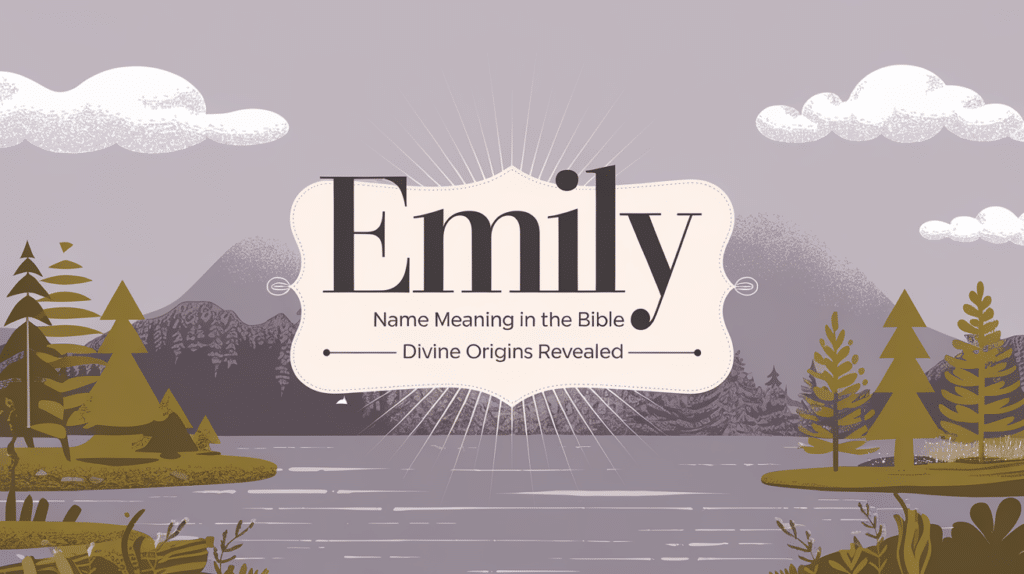Many parents searching for the perfect name for their daughter stumble upon Emily.
It’s a beautiful, timeless choice, but does it have biblical roots? For those who value faith traditions, understanding a name’s connection to scripture can be meaningful.
The name Emily doesn’t actually appear in the Bible’s pages, yet its meaning carries qualities that resonate greatly with biblical values.
Through the centuries, parents have chosen this name not just for its lovely sound but for what it represents.
This scrutiny reveals how Emily, though absent from scripture itself, embodies virtues celebrated throughout biblical teachings.
From its Latin origins to its spiritual connections, Emily’s meaning offers a enthralling glimpse into how names and faith intertwine in unexpected ways.
The Origins of the Name Emily: Studying Its Roots

The name Emily has a rich and engrossing history, rooted in both linguistic and cultural traditions.
It is derived from the Latin name Aemilia, which was the feminine form of Aemilius, a Roman family name.
The name Aemilius itself is believed to be linked to the Latin word Aemulus, meaning “rival” or “eager,” suggesting qualities of ambition and competitiveness.
Over time, the name evolved, passing through different languages and cultures before becoming the well-loved name Emily that we know today.
In the early days, Aemilia was primarily used in ancient Rome, but as the Roman Empire expanded, the name spread throughout Europe.
In the medieval period, it began to take on various forms, depending on the region.
By the time it reached the English-speaking world, the name had transformed into Emily, gaining popularity in the 18th and 19th centuries, especially after the publication of works by famous authors such as Emily Brontë, whose literary legacy further cemented the name’s place in history.
What is the Biblical Meaning of the Name Emily?

Though Emily doesn’t appear directly in the Bible, its Latin roots in “Aemilia” mean “industrious” or “striving” qualities that align with biblical virtues.
This industriousness echoes Proverbs 31:17, which praises a woman whose “arms are strong for her tasks.”
Some scholars connect Emily to the Hebrew “Emek” (valley), symbolizing humility and God’s provision in scripture.
The name’s essence of diligent striving reflects biblical teachings on faithful work found in Colossians 3:23: “Whatever you do, work at it with all your heart.”
While not found in biblical text itself, Emily embodies the scriptural values of diligence, perseverance, and purposeful effort.
Hebrew Interpretation of Emily: Biblical Context and Meaning
Emily doesn’t have direct Hebrew origins. The name derives from the Latin “Aemilius,” not from Hebrew etymology. However, some connection can be made through similar-sounding Hebrew names.
The Hebrew name “Emunah” (אֱמוּנָה) shares some phonetic similarity with Emily and means “faith” or “belief” in Hebrew. This name emphasizes spiritual devotion and trust.
In contemporary Israel, “Emilia” (אמיליה) is sometimes used as a Hebrew version of Emily, though it maintains its Latin roots rather than having a native Hebrew meaning.
While not Hebrew in origin, Emily’s qualities of strength and industriousness align with Hebrew values of “melachah” (מְלָאכָה) meaning “work” or “craftsmanship.”
Though Emily doesn’t appear in biblical texts, its themes of striving (from Latin “aemulus”) parallel Hebrew biblical concepts of perseverance and dedication found in figures like Ruth and Esther.
For Hebrew-speaking families today choosing the name Emily, it often represents a bridge between traditional values and modern global naming practices.
Popular Variations of Emily: Related Names Across Cultures

The name Emily has traveled across countries and through centuries, picking up new sounds and spellings along the way.
Parents drawn to this classic name might be surprised by how many variations exist across different cultures and languages. Some are subtle tweaks, while others alter the name entirely but still carry its essence.
Here’s a look at some of the most common variants of Emily that families might consider.
| Variant | Origin | Meaning Connection |
|---|---|---|
| Emma | Germanic | Shares Emily’s root in “ermen” (whole/universal) |
| Emilia | Latin | Direct Latin form of Emily |
| Emilie | French | French variation of Emily |
| Amélie | French | French diminutive with softer pronunciation |
| Emiliana | Spanish/Italian | Extended form meaning “rival” or “industrious” |
| Emmeline | Old German | Combines “Emma” and “line” (tender) |
| Emmalyn | American | Modern blend of Emma and Lynn |
| Emmy | English | Affectionate nickname for Emily |
| Millie | English | Popular diminutive of Emily |
| Emerson | English | Surname-turned-first name derived from Emily |
| Emmi | Finnish/German | Short, sweet international variant |
Each of these variations carries the same industrious spirit as Emily, just dressed in different cultural clothing.
Some parents might choose a variant that honors their heritage, while others simply prefer the sound of one over another.
But no matter which form you choose, your child’s name will connect to a rich tradition of strength and determination that spans continents and generations.
Emily Through the Ages: Famous Bearers and Nicknames

Famous People Named Emily
Literature & Arts
- Emily Dickinson – Influential American poet
- Emily Brontë – Author of “Wuthering Heights”
- Emily Giffin – Contemporary novelist
- Emily Henry – Bestselling romance author
Film & Television
- Emily Blunt – Award-winning British actress
- Emily Watson – Oscar-nominated actress
- Emily Deschanel – Star of “Bones” television series
- Emily VanCamp – Actress known for “Revenge” and Marvel films
Music
- Emily Haines – Lead singer of Metric
- Emily Armstrong – Lead vocalist of Dead Sara
- Emily Robison – Founding member of The Chicks
- Emily King – Grammy-nominated R&B artist
Sports
- Emily Seebohm – Olympic swimming champion
- Emily Cook – Olympic freestyle skier
- Emily Scott – Olympic speed skater
- Emily Fox – Professional soccer player
Common Nicknames for Emily
| Traditional | Creative | International |
|---|---|---|
| Em | Millie | Emi (Japanese) |
| Emmy | Lee | Émilie (French) |
| Emmie | Lily | Mila (Slavic) |
| Emms | Em-J | Emilia (Italian) |
| Em-Em | Emkin | Amelia (variant) |
How Popular Is The Name Emily?

The name Emily reached its peak popularity in the 20th century, particularly in English-speaking countries.
It consistently ranked among the top names for girls in the United States and other Western nations, where it has become synonymous with charm, elegance, and timeless beauty.
Its enduring popularity speaks to the lasting appeal of its soft sound and classic origins.
Today, Emily is a beloved name in many parts of the world, reflecting a blend of ancient Roman history and modern grace.
| Decade | US Ranking | Notable Trend |
|---|---|---|
| 1980s | Rising | Began climbing from outside top 100 |
| 1990s | Top 10 | Reached #1 in 1996 |
| 2000s | #1 | Dominated charts for entire decade |
| 2010s | Top 20 | Gradually declining but remained popular |
| 2020s | Top 25 | Proving its staying power |
What makes Emily’s popularity fascinating is its staying power.
Unlike trendy names that spike and fall, Emily has maintained steady popularity for decades.
Parents continue choosing it for its simple elegance, meaningful roots, and the perfect balance it strikes between familiar and distinctive.
A child named Emily today joins a respected tradition but won’t be just another Emily in her class.
The Spiritual Essence of Emily
The name Emily carries a spiritual significance that goes beyond its literal meaning of “industrious” or “striving.”
In many faith traditions, particularly Christianity, this concept of industriousness isn’t just about working hard—it’s about approaching life’s challenges with purpose and divine intention.
Biblical Foundations
- Proverbs 12:24 – “Diligent hands will rule, but laziness ends in forced labor”
- Colossians 3:23 – “Whatever you do, work at it with all your heart, as working for the Lord”
- 2 Timothy 2:15 – “Do your best to present yourself to God as one approved”
Spiritual Virtues Embodied
Purposeful Diligence:
- The name Emily reflects working with intention and divine purpose, not just random effort
- Scripture consistently praises those who apply themselves wholeheartedly to their calling
- This quality sees daily work as service to something greater than ourselves
- An Emily approaches tasks with mindful dedication, understanding her efforts honor God
- This kind of diligence transforms ordinary tasks into meaningful spiritual practice
- The industrious nature of Emily suggests stewardship of talents and resources
Graceful Perseverance:
- Emily’s meaning encompasses steadfastness through difficulties and challenges
- This spiritual quality mirrors biblical figures who maintained faith through trials
- What distinguishes this perseverance is that it remains flexible and graceful
- The spiritual Emily knows when to persist and when to adapt with wisdom
- This resilience builds character and deepens faith through life’s inevitable struggles
- Emily’s perseverance isn’t stubborn or rigid but flows with God’s guidance
Excellence With Humility:
- The most beautiful aspect of Emily balances striving for excellence with genuine humility
- The industriousness in Emily’s meaning isn’t about personal glory or recognition
- It transforms ordinary work into sacred offering through pure intention
- The spiritual Emily doesn’t seek praise for achievements but sees them as expressions of gratitude
- This attitude creates excellence that uplifts others rather than competing with them
- Emily reminds us that our best work comes when ego steps aside for higher purpose
Summing Up
In tracing Emily’s path from Latin roots to biblical significance, we’ve uncovered a name that truly embodies divine industriousness and graceful excellence.
Whether through its connection to the Hebrew “amal” or its historical bearers who exemplified its virtuous qualities, Emily continues to inspire those who carry it.
As numbers and scripture alike affirm, Emily represents the beautiful balance of determined effort and elegant grace, that is, a divine pairing that echoes through centuries of faith and tradition.
Truly, to bear the name Emily is to carry a blessing of purposeful living.


















